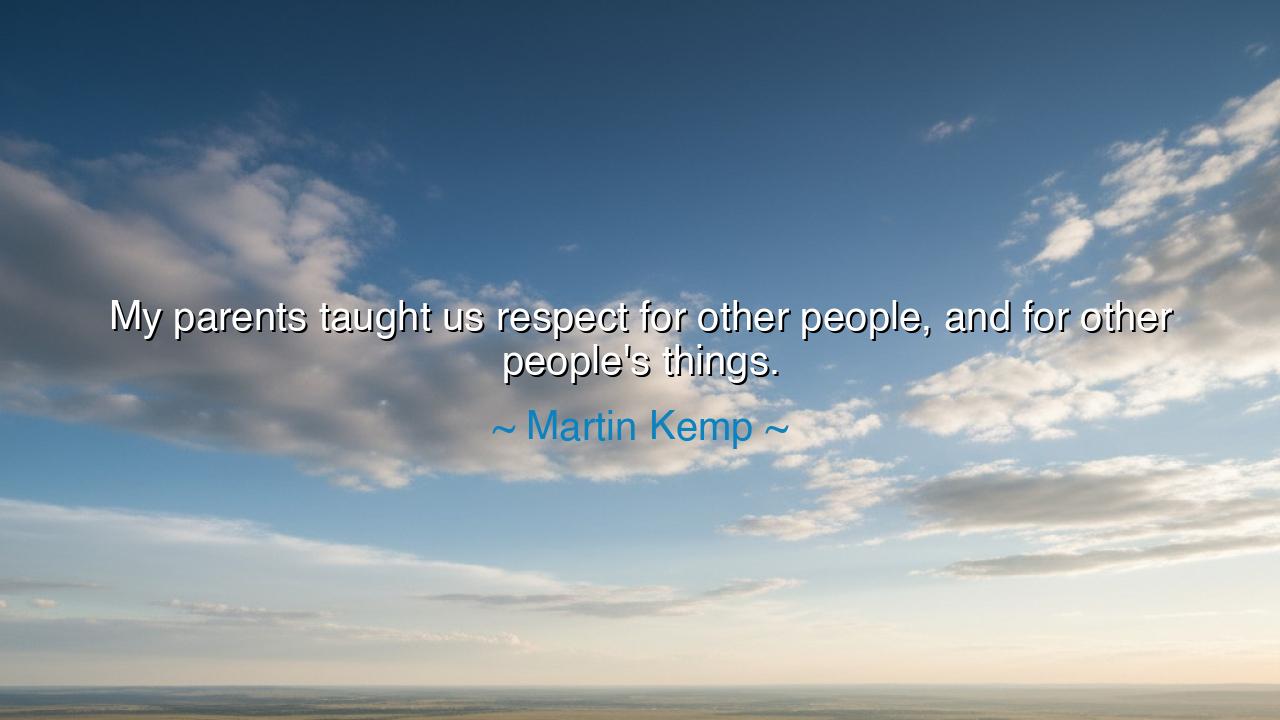
My parents taught us respect for other people, and for other






The words of Martin Kemp carry with them the quiet strength of timeless wisdom: “My parents taught us respect for other people, and for other people’s things.” In this simple declaration, there is no grand boast, no call to conquest. Instead, there is the echo of something more enduring than victory: the foundation of a life rooted in respect. His voice reminds us that all greatness, whether in art, in leadership, or in daily living, is built not first upon power, but upon reverence for others—their dignity, their space, their possessions, their very being.
From the ancients we know that respect is the soil from which harmony grows. A city without respect for its citizens crumbles into tyranny. A family without respect for one another becomes fractured and cold. A soul without respect for others wanders empty, consumed by pride. In Kemp’s remembrance of his parents, we see the eternal truth: that values passed from one generation to the next are not merely words spoken but practices lived, examples set in quiet moments when the world is not watching.
History, too, teaches us this. Consider the example of George Washington, who in his youth copied out “Rules of Civility,” a list of maxims that emphasized courtesy, self-restraint, and honor toward others. Though he would one day lead armies and preside over a new nation, it was this foundation of respect—for others’ voices, for others’ rights, even for others’ property—that gave him the stature not of a tyrant but of a statesman. Without this root, his power might have been a danger; with it, his leadership became a blessing.
So it is with Kemp’s reflection: respect for people and their things is no small lesson of childhood, but the safeguard of society. For when a person learns to honor what belongs to another, they learn to restrain greed, to temper envy, to guard against violence. When a child learns to treat their neighbor’s possessions with care, they are also learning to honor the invisible treasures—their neighbor’s feelings, struggles, and dignity. To respect what is tangible is the beginning of respecting what is unseen.
We might imagine Kemp’s parents not as rulers or philosophers, but as everyday guides, shaping their children with steady hands. And yet, their teaching holds the same gravity as the lessons of the wise. The ancients knew well that civilizations are built first in the home. The habits of children—how they treat their companions, how they regard the boundaries of others—are seeds that grow into the fields of society. Respect learned at the table becomes justice practiced in the marketplace.
The lesson is clear: respect is not weakness—it is strength. To honor another does not diminish you; it enlarges you. To treat another’s possessions with care does not bind your freedom; it protects the freedom of all. The warrior who respects his foe fights with honor. The citizen who respects the law preserves liberty for his people. The child who respects their neighbor grows into an adult who builds peace rather than strife.
So let each listener take this wisdom into their own life. Guard your words, that they may never dishonor another. Guard your hands, that they may never take what is not yours. Teach your children, by example, to tread lightly upon the world and to honor those who walk beside them. And in doing so, you will not only preserve the dignity of others, but you will ennoble your own soul.
Thus, from the home of Martin Kemp, we hear the echo of an eternal truth: that the greatness of a people is not measured by wealth or conquest, but by their respect for one another. Let this be the cornerstone of your life, and your days will be marked not by conflict, but by harmony, not by division, but by peace.






AAdministratorAdministrator
Welcome, honored guests. Please leave a comment, we will respond soon